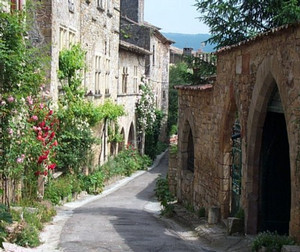■
essence (n.)
late 14c., essencia (respelled late 15c. on French model), from Latin essentia "being, essence," abstract noun formed (to translate Greek ousia "being, essence") from essent-, present participle stem of esse "to be," from PIE *es- "to be" (source also of Sanskrit asmi, Hittite eimi, Old Church Slavonic jesmi, Lithuanian esmi, Gothic imi, Old English eom "I am;" see be).
Originally "substance of the Trinity;" the general sense of "basic element of anything" is first recorded in English 1650s, though this is the underlying notion of the first English use of essential. Meaning "ingredient which gives something its particular character" is from c. 1600, especially of distilled oils from plants (1650s), hence "fragrance, perfume" (17c.). In 19c. U.S., essence-peddler could mean "medical salesman" and "skunk."
existence (n.)
late 14c., "reality," from Old French existence, from Medieval Latin existentia/exsistentia, from existentem/exsistentem (nominative existens/exsistens) "existent," present participle of Latin existere/exsistere "stand forth, come out, emerge; appear, be visible, come to light; arise, be produced; turn into," and, as a secondary meaning, "exist, be;" from ex- "forth" (see ex-) + sistere "cause to stand" (see assist).
non-existence (n.) Look up non-existence at Dictionary.com
stet
direction to printer to disregard correction made to text, 1755,
from Latin stet "let it stand,"
third person singular present subjunctive of stare "to stand, stand upright, be stiff,"
from PIE root *stā- "to stand, set down, make or be firm,"
with derivatives meaning "place or thing that is standing"
(source also of Sanskrit tisthati "stands;"
Avestan histaiti "to stand;"
Persian -stan "country,"
literally "where one stands;"
Greek histemi "put, place, cause to stand; weigh,"
stasis "a standing still,"
statos "placed,"
stater "a weight, coin,"
stylos "pillar;"
Latin sistere "stand still, stop, make stand, place, produce in court,"
status "manner, position, condition, attitude,"
stare "to stand,"
statio "station, post;"
Lithuanian stojus "place myself,"
statau "place;"
Old Church Slavonic staja "place myself,"
stanu "position;"
Gothic standan,
Old English standan "to stand,"
stede "place,"
steall "place where cattle are kept;"
Old Norse steði "anvil,"
stallr "pedestal for idols, altar;"
German Stall "a stable;"
Old Irish sessam "the act of standing").
